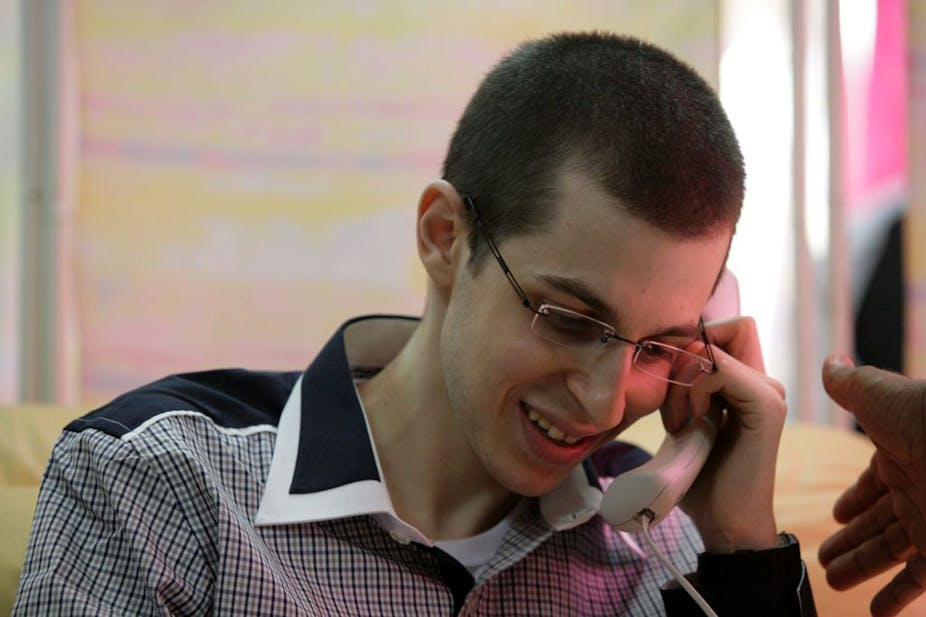When Gilad Shalit was dragged away in a cross-border raid in June 2006, it’s doubtful he or his captors would have imagined five years’ of negotiations lay ahead.
Nor in their most fevered imaginings would they have expected 1,000 Palestinian prisoners, some of them with multiple life sentences for murder, would be the price of his release.
Poster boy
But Shalit became an unwitting poster boy for both sides. On the part of the Israelis, the campaign to free Shalit represented the embodiment of their “no man left behind” policy, a guiding principle integral to the esprit of the nation and its conscript forces.
His captivity also provided a rare touchstone for the Israeli government; a case in international law and opinion where they were undeniably in the right.
For Hamas, the initial abduction and then continued secrecy of Shalit’s whereabouts offered evidence of their own strengths, as well as a foil to the omnipotent image of the IDF and Mossad.
And of course the hapless NCO was also an incredibly valuable bargaining chip, not only with the Israelis but with those in Fatah who wanted to cut deals with the enemy.
But good hands are worthless if you don’t cash them in, and for Hamas, Shalit eventually became a liability. His detention provided an unsolvable impediment to longer term peace and served as an easy Israeli example to the rest of the world of how little import Hamas seemed to place on negotiation and human rights.
Moreover, as Fatah’s diplomatic stocks rose following their tilt at UN recognition, Hamas needed something to show that it too was worth talking to.
Propaganda victory
The release of Shalit and the freeing of the 1,000 prisoners therefore becomes a propaganda victory for Hamas, at the same time stealing away some of Fatah’s limelight. This suits both Hamas and the Israelis.
The truth is that this deal has been on the table for a long time.
The sticking point has always been the release of a certain group of high status prisoners and where they would reside afterwards.
With the input of the now free-wheeling Egyptians (and the Syrians having other fish to fry at home), these last quibbles were solved even while Mahmoud Abbas was standing at the podium in the UN.
As with comedy, Middle Eastern politics is all about the timing.
Moral dilemmas
The moral dilemmas for the Israelis are huge.
Is one man’s freedom really worth the amnesty of so many enemies of the Jewish state? Should the joy of Shalit’s parents be bought at the expense of others, who will see the killers of their own children walk free to a heroic welcome? What if some of those freed go on to perpetrate further outrages?
And what of that old adage of never negotiating with terrorists? Has a market price now been set that will encourage further abductions?
The political dilemmas are substantial too.
Like any Prime Minister in the pluralistic Israeli system, Netanyahu depends on the goodwill of a cluster of ill-fitting coalition partners to retain government.
The hardcore Zionist cabinet members like Foreign Minister Avigdor Lieberman have already shown their discontent by voting against the deal.
Netanyahu must therefore walk a difficult path between courting the significant public approval amongst the moderates, whilst being mindful of alienating minority groups that are nevertheless crucial to his coalition.
Symbolic move
Of course one shouldn’t forget Shalit as a human being rather than a political token. No doubt he has woken up every morning for the last five years with the fear that he could be beheaded in front of a Hamas flag.
That he won’t be is a happy conclusion to a minor but symbolic episode in the Israel-Palestine peace process.
Now the parties concerned just have to deal with statehood, 1967 borders, disputed settlements and the right of Palestinian refugees to return.

